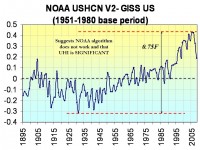By Michael Scott, Cleveland Plain Dealer
This may not play well in Northeast Ohio, but federal climate officials this week reported that planet Earth just had its seventh-warmest January in more than 125 years of records.
That’s right, even though Cleveland just finished 6.5 degrees colder than normal (remember that 13-below-zero day?), most of the rest of the world got hotter last month—including Australia, where records were broken with one 114-degree day.
The most recent report from the National Climatic Data Center in North Carolina asserts that the combined global land and ocean surface temperature for January was 54.55 degrees Fahrenheit—or 0.95 degrees above the 20th-century average temperature.
But in Cleveland—where we endured nine January days in the single digits or below zero and nearly set a snow record for the month—something may seem out of whack.
Does this mean we can’t even catch a break from global warming? “We were just at the wrong end of things in January,” said Ohio climatologist Jeff Rogers of Ohio State University. “The atmosphere largely carries spells of unusually cold and unusually warm weather in waves, and we were caught in a cold one.
“But that’s all it means—you can’t really look at one event, or one month, and say it’s proof of global warming or that global warming doesn’t exist, but plenty of people are trying.” Stu Ostro, director of communications for the Weather Channel, agreed. “The key word, as always, is context,” Ostro said.
“The map put out by NOAA [the National Oceanic and Atmospheric Administration] says it better than any words can tell: Cleveland, the state of Ohio and much of the eastern part of the U.S. had a cold January—but take a look at the rest of the world.”
Or even just the United States. Despite Northeast Ohio’s efforts to drive the numbers down, temperatures for the contiguous United States were slightly above the long-term average, about 0.4 degrees above the January average of 31.2 degrees.
Still, Northeast Ohio wasn’t the only cold spot in a warming world: Snowstorms swept across northern and eastern Europe and reached as far south as Spain and northern Italy. The United Kingdom experienced some of the lowest temperatures in 15 years. And snow cover, based on satellite observations, was near average across North America (6.8 million square miles) and Eurasia (11.3 million square miles) compared with the last 40 years of data. Read more here.
Icecap Note: As shown here, NOAA data suffers from major station dropout (75% of the worlds stations dropped in 1990 most of them high latitude rural and thus the colder stations), a ten fold increase in missing data, poor instrument siting (841 of the 1221 US stations evaluated by surfacestations.org in the last 18 months - only 11% met government standards with 89% with improper siting leading to excess warmth), use of instruments with warm bias not adjusted for, and most importantly NO adjustment for urbanization (which as you know produces the urban heat island). For all these reasons, you can pretty much discard the NOAA data for the world and for that matter the US where in their latest version of the USHCN data, they removed the urban adjustment. Look what that does for the temperatures versus the GISS US data which maintains a UHI adjustment based on night lights.

Comparison of the new USHCN to the GISS USHCN shows the NOAA version has increased the warming relative to the GISS by 0.75F since 1930.
GISS’s global adjustments are yet another issue as Steve McIntyre/Ken Gregory showed in my analysis here. The only reliable source for global data is the satellite which had January globally as the 8th warmest but in 30 years with a cold northern US, parts of Europe, northern Australia, Brazil and parts of Siberia but warmth in southern Australia, Argentina, parts of Russia, China and the southwestern US.




